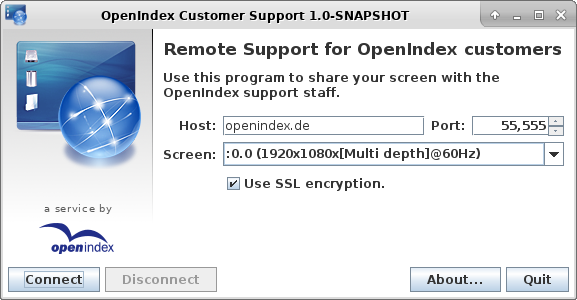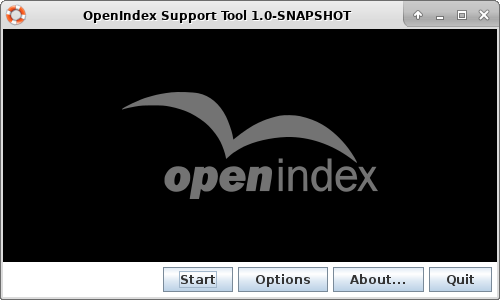-
-
Notifications
You must be signed in to change notification settings - Fork 26
Configuration
This page describes how to customize the application for yourself.
Any customization of Customer Support Tool (besides the source code itself) can be done through the files in the Customer/src/main/resources/de/openindex/support/customer/resources directory.
The following screenshot shows an example for a branded Customer Support Tool with custom default settings, custom translations and a company logo on the sidebar:

All application settings are stored in the application.properties file. You may provide customization for different languages e.g. by creating a application_de.properties file (for German language). If a value in application_de.properties is not present, the program will use the default value from application.properties.
| Key | Description |
|---|---|
name |
internal name of the application; used to create the work directory in users home directory |
title |
readable title of the application |
version |
version number of the application; automatically replaced during the build process |
website.author |
website of the author / company; used in the about dialog |
website.source |
website of the source code; used in the about dialog |
connectionSettingsVisible |
hide connection settings by default on application startup (host, port & SSL) |
connectionSettingsEditable |
allow the customer the change the connection settings (host, port & SSL) |
permanentOptions |
permanently save and load application settings in users home directory |
customTrustStore |
allow the user to place its own truststore into his home directory |
default.host |
default hostname used in the application |
default.port |
default port number used in the application |
default.ssl |
enable / disable SSL encryption by default in the application |
Besides these there are certain settings starting with i18n.. These key may be used to provide translations of the application in other languages. See application_de.properties as an example for a German translation.
The application icon is loaded from application.png and might be replaced with your own customized icon.
Other icons used by the application are stored in the icon_*.png files within the resources directory. These might be replaced by your own customized icons. Make sure to use an image size of 16x16 pixels.
Images placed on the left side of the application windows are stored in sidebar.png and sidebar_*.png within the resources directory. These might be replaced by your own customized images. The width of the sidebar in the application windows is automatically calculated from the image width.
If a file called branding.png is present in the resources directory, it is painted over the sidebar on the bottom. This image can be used to integrate a company logo into the application. The branding image should have the same width as the sidebar image itself.
According to the current language you might provide different branding images - e.g. a file called branding_de.jpg would be used, if the application is loaded in German language.
The about.html file contains the application information shown in the about dialog. You might translate the file into other languages and append the language code to the file name like about_de.html for the German translation.
The file can be formatted freely according to the HTML 3.2 standard.
The application title and version numbers are automatically replaced in this file during the build process.
Notice: If you modify the application information make sure, that notes about the authors and licenses are kept intact.
The application provides its default SSL truststore in the truststore.jks file. The password to access the truststore is stored in the truststore.jks.txt file. This truststore is used in conjunction with the custom keystore, that is integrated into Staff Support Tool.
Any customization of Staff Support Tool (besides the source code itself) can be done through the files in the Staff/src/main/resources/de/openindex/support/staff/resources directory.
The following screenshot shows an example for a branded Staff Support Tool with a custom startup image:

All application settings are stored in the application.properties file. You may provide customization for different languages e.g. by creating a application_de.properties file (for German language). If a value in application_de.properties is not present, the program will use the default value from application.properties.
| Key | Description |
|---|---|
name |
internal name of the application; used to create the work directory in users home directory |
title |
readable title of the application |
version |
version number of the application; automatically replaced during the build process |
website.author |
website of the author / company; used in the about dialog |
website.source |
website of the source code; used in the about dialog |
permanentOptions |
permanently save and load application settings in users home directory |
customKeyStore |
allow the user to place its own keystore into his home directory |
sshHostKeyCheck |
enable verification of host keys, when SSH connections are established |
default.localPort |
default local port number used in the application |
default.ssh |
enable / disable SSH tunneling by default in the application |
default.sshHost |
default SSH hostname in the application |
default.sshKey |
default path to the SSH key in the application |
default.sshPort |
default SSH port number in the application |
default.sshKeyAuth |
enable / disable SSH public key authentication by default in the application |
default.sshRemotePort |
default SSH remote port number in the application |
default.sshUser |
default SSH user name in the application |
default.ssl |
enable / disable SSL encryption by default in the application |
Besides these there are certain settings starting with i18n.. These key may be used to provide translations of the application in other languages. See application_de.properties as an example for a German translation.
The application icon is loaded from application.png and might be replaced with your own customized icon.
Other icons used by the application are stored in the icon_*.png files within the resources directory. These might be replaced by your own customized icons. Make sure to use an image size of 16x16 pixels.
Images placed on the left side of the application windows are stored in the sidebar_*.png files within the resources directory. These might be replaced by your own customized images. The width of the sidebar in the application windows is automatically calculated from the image width.
If a file called branding.png is present in the resources directory, it is painted over the sidebar on the bottom. This image can be used to integrate a company logo into the application. The branding image should have the same width as the sidebar image itself.
According to the current language you might provide different branding images - e.g. a file called branding_de.jpg would be used, if the application is loaded in German language.
If a file called startup.png is present in the resources directory, it is painted over the black background on application startup. If this file is not present, the application.png file is used instead.
The about.html file contains the application information shown in the about dialog. You might translate the file into other languages and append the language code to the file name like about_de.html for the German translation.
The file can be formatted freely according to the HTML 3.2 standard.
The application title and version numbers are automatically replaced in this file during the build process.
Notice: If you modify the application information make sure, that notes about the authors and licenses are kept intact.
The application provides its default SSL keystore in the keystore.jks file. The password to access the keystore is stored in the keystore.jks.txt file. This keystore is used in conjunction with the custom truststore, that is integrated into Customer Support Tool.
If you like to provide a customized application bundle, it is strongly recommended to generate your own keystore & truststore. You can create the required files by starting the script share/ssl/init.ssh. The script will generate a customized keystore.jks / keystore.jks.txt and truststore.jks / truststore.jks.txt, which you can place into the resources folder of Customer Support Tool and Staff Support Tool.